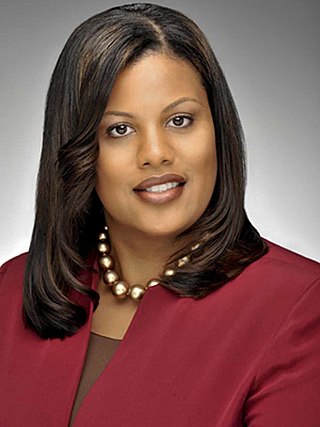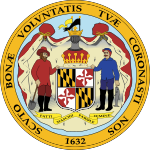The current Constitution of the State of Maryland, which was ratified by the people of the state on September 18, 1867, forms the basic law for the U.S. state of Maryland. It replaced the short-lived Maryland Constitution of 1864 and is the fourth constitution under which the state has been governed. It was last amended in 2022.

Sheila Ann Dixon is an American politician who served as the forty-eighth mayor of Baltimore, Maryland. When the former mayor, Martin O'Malley, was sworn in as governor on January 17, 2007, Dixon, the president of the Baltimore City Council, served out the remaining year of his term. In November 2007, she was elected mayor. She was the first African-American woman to serve as president of the City Council, Baltimore's first female mayor, and Baltimore's third black mayor.

The 2007 Baltimore mayoral election was held on November 6, 2007. Because Baltimore's electorate is overwhelmingly Democratic, Sheila Dixon's victory in the Democratic primary on September 11 all but assured her of victory in the general election; she defeated Republican candidate Elbert Henderson in the general election by an overwhelming majority. Dixon, who as president of the Baltimore City Council became mayor in January 2007 when Martin O'Malley resigned to become Governor of Maryland, was the first woman to be elected to the office.

Stephanie C. Rawlings-Blake is an American politician and attorney who served as the 50th Mayor of Baltimore from 2010 to 2016, the second woman to hold that office. She has also served as secretary of the Democratic National Committee and as president of the United States Conference of Mayors.

Jill Priscilla Carter is an American attorney and politician who represents Maryland's 41st legislative district of Baltimore City in the Maryland State Senate. She previously represented the same district in the Maryland House of Delegates. She was elected to the Maryland legislature in 2002 and took office in January 2003, resigning in 2017. She was appointed to the state Senate on May 4, 2018.

Thomas Edward Perez is an American politician and attorney currently serving as senior advisor to the president of the United States and director of the White House Office of Intergovernmental Affairs, holding both positions since June 2023. Perez previously served as the United States secretary of labor (2013–2017), the chair of the Democratic National Committee (2017–2021), and United States assistant attorney general for civil rights (2009–2013).

Keiffer Jackson Mitchell Jr. is an American politician from Baltimore, Maryland, who once served in the Maryland House of Delegates and the Baltimore City Council and was a candidate in the 2007 mayoral election.

Mary Pat Clarke is an American politician who represented the 14th district in the Baltimore City Council. She served in Baltimore, Maryland politics as both council president and council member for 24 out of the last 35 years as of 2010. She is the first woman ever elected president of the Baltimore City Council and until 2016 was the only non-incumbent to win a council seat since single-member districts were mandated by Baltimore voters through Question P in 2002.

The Baltimore City Council is the legislative branch that governs the City of Baltimore and its more than 600,000 citizens. It has 14 members elected by district and a president elected at-large; all serve four-year terms. The Council holds regular meetings on alternate Monday evenings on the fourth floor of the Baltimore City Hall. The council has seven standing committees, all of which must have at least three members. As of 2022, the President receives an annual salary of $131,798, the Vice President gets $84,729 and the rest of councillors receive $76,660. The current city council president, Nick Mosby, was sworn on December 10, 2020.

Ranked-choice voting (RCV) can refer to one of several ranked voting methods used in some cities and states in the United States. The term is not strictly defined, but most often refers to instant-runoff voting (IRV) or single transferable vote (STV).

William Claiborne Ferguson IV is an American politician, attorney, and former schoolteacher. He is a Democratic member of the Maryland Senate, representing the 46th district since 2011, and serving as the President of the Maryland Senate since 2020. The district is composed of parts of Baltimore City.

The 2011 Baltimore mayoral election was held on November 8, 2011. Because Baltimore's electorate is overwhelmingly Democratic, Stephanie Rawlings-Blake's victory in the Democratic primary on September 13, 2011 all but assured her of victory in the general election.

Municipal elections were held in San Diego in 2012 for mayor, city attorney, five seats to the San Diego City Council, and propositions. The primary election was held on June 5, 2012, and the general election was held on November 6, 2012. This was the first city council election to use nine council districts. Two city council incumbents ran for reelection in their same district and one ran for election in the newly created ninth district.

Nick J. Mosby is an American politician from Baltimore, Maryland. He is the current President of the Baltimore City Council. First elected to serve on the City Council from 2011 to 2016, Mosby was subsequently appointed in 2017 to the Maryland House of Delegates, representing Baltimore City's 40th District. He was elected as Baltimore City Council President in November 2020, assuming the role in December of that year.

The 2016 Baltimore mayoral election was held November 8, 2016 concurrent with the General Election. Stephanie Rawlings-Blake, the incumbent mayor, did not run for reelection. Catherine Pugh won the election on November 8, 2016, with 57% of the popular vote, and took office on December 6, 2016.

Jessica Marie Page Feldmark is a Democratic member of the Maryland House of Delegates.

Mary Courtney Watson is a Democratic member of the Maryland House of Delegates. She was previously a member of the Howard County Council from 2006 to 2014, and she was a member of the Howard County Board of Education from 2002 to 2006.

Bernard C. "Jack" Young is an American politician and former mayor of Baltimore, Maryland. A member of the Democratic Party, Young was elected to the Baltimore City Council in 1996, representing Baltimore's second district. In 2010, Young became City Council President following Stephanie Rawlings-Blake taking over as mayor due to the indictment of Sheila Dixon. On April 2, 2019, Young was named acting mayor during the leave of absence by Mayor Catherine Pugh. Following Pugh's resignation on May 2, 2019, Young was fully vested as mayor of the city. In October 2019, Young announced that he was running to retain his position as Mayor in the 2020 election. He lost the Democratic nomination for mayor, despite raising more money than the other candidates. Instead, Brandon Scott won the nomination for mayor in the 2020 general election, which he went on to win.

The 2020 Baltimore mayoral election was held on November 3, 2020, concurrent with the general election. Brandon Scott won the Democratic Party's nomination for mayor and the general election.

The 2024 Baltimore mayoral election will be held on November 5, 2024, to elect the mayor of Baltimore, Maryland. Incumbent Brandon Scott was first elected in 2020 with 70.5% of the vote and is running for re-election to a second term. The Democratic and Republican primary elections will be held on May 14, 2024.



















